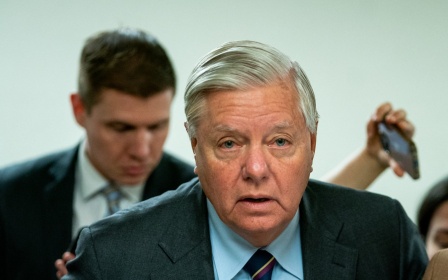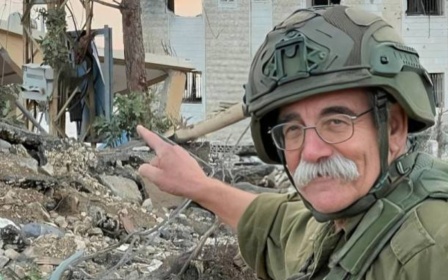How have Israel's allies reacted to the ICC warrants?

The arrest warrants issued by the International Criminal Court (ICC) against Israeli Prime Minister Benjamin Netanyahu and his former defence minister, Yoav Gallant, have caused headaches for many of Israel's closest allies.
While neither Israel nor its main sponsor the US are members of the ICC, most of its European allies are. Now, those European countries' need to back the integrity of the court - particularly in support of similar a warrant against Vladimir Putin - has come into tension with their support for Israel.
Middle East Eye takes a look at how Israel's allies have reacted to the warrants:
United States
The US is not a member of the ICC, having refused to ratify its founding Rome Statue in 2002.
New MEE newsletter: Jerusalem Dispatch
Sign up to get the latest insights and analysis on Israel-Palestine, alongside Turkey Unpacked and other MEE newsletters
US President Joe Biden described the arrest warrants as "outrageous".
"Let me be clear once again: whatever the ICC might imply, there is no equivalence - none - between Israel and Hamas," he said. "We will always stand with Israel against threats to its security."
Congressman Mike Waltz, president-elect Donald Trump's choice to be the next national security advisor, also said the court had "no credibility" and that it could "expect a strong response" when the new administration comes into office in January.
Similarly, Republican Senator Lindsey Graham called the court "a rogue and politically motivated organisation that is trampling on the very concept of the rule of law".
United Kingdom
The UK is a member of the ICC. The British government's initial response to the warrants was non-commital and repeated attempts by journalists to get government officials to confirm if they'd arrest the Israeli leaders were rebutted.
Later on Friday, however, a spokesperson for British Prime Minister Keir Starmer told the Press Association that the government would "always comply with its legal obligations as set out by domestic law and indeed international law."
"I’m not going to get ahead of the process or provide commentary on individual cases," he also said.
The government has refused to say explicitly whether it will comply with the arrest warrant. On Friday morning Home Secretary Yvette Cooper declined to comment on the issue.
"The International Criminal Court is obviously independent. We respect the court, its independence, and we are clear of its role, which is different from the UK government’s role," she said.
"The vast majority of International Criminal Court cases do not become a matter for the UK legal processes, law enforcement processes, or for the UK Government."
Germany
Germany is a member of the ICC, though the German government has played down any suggestion that Netanyahu or Gallant could be arrested on its soil.
Speaking to reporters on Friday, chief government spokesperson Steffen Hebestreit said he would "find it hard to imagine that arrests could be made in Germany on this basis".
In a separate statement, the German government said it was "one of the biggest supporters of the ICC".
"At the same time, the consequence of German history is that unique relationships and a great responsibility associated with Israel," it said.
"We will carefully examine the domestic steps. Further only would be possible if a stay of Prime Minister Benjamin Netanyahu and former defence minister Yoav Gallant is foreseeable in Germany".
France
France is a member of the ICC and has said it would act “in line with the ICC’s statutes”.
However, foreign ministry spokesman Christophe Lemoine said on Thursday the issue was "legally complex" and would not be pressed on whether France would arrest the Israelis.
On Friday, he issued another statement in which he simply said: “France takes note of this decision."
Lemoine said "true to its long-standing commitment to supporting international justice", France "reiterates its attachment to the independent work of the court, in accordance with the Rome Statute”.
Hungary
Hungary, is so far the only ICC member to say explicitly that it does not intend to arrest Netanyahu and Gallant if they step foot on its soil.
Speaking on Hungary radio, Prime Minister Vikter Orban said that the warrants had a "political" basis and interfered in an ongoing conflict.
"Later today, I will invite the Israeli prime minister, Mr Netanyahu, to visit Hungary, where I will guarantee him, if he comes, that the judgment of the ICC will have no effect in Hungary, and that we will not follow its terms," he said.
"There is no choice here, we have to defy this decision."
Italy
ICC member Italy hosted the diplomatic conference in 1998 that led to the Rome Statute and the founding of the court.
It was therefore perhaps unsurprising that although the Italian government criticised the warrants as "wrong", the country's defence minister, Guido Crosetto, on Thursday said if Netanyahu and Gallant “were to come to Italy, we would have to arrest them”.
Belgium
Belgium is a member of the ICC and its foreign ministry said those responsible for war crimes in Gaza should be prosecuted.
“The fight against impunity wherever crimes are committed is a priority for Belgium, which fully supports the work of the" ICC, the ministry posted on X.
“Those responsible for crimes committed in Israel and Gaza must be prosecuted at the highest level, regardless of who committed them.”
The Netherlands
The Netherlands has been more explicit than other ICC members in saying it would arrest Netanyahu and Gallant if they entered the country.
Foreign Minister Caspar Veldkamp said that his country “respects the independence of the ICC”.
“We won’t engage in non-essential contacts and we will act on the arrest warrants. We fully comply with the Rome Statute of the ICC,” he added.
Austria
Austria is a member of the ICC. Its government has both criticised the arrest warrants and also seemed to confirm that it would comply with the court's decision.
"The ICC decision to issue arrest warrants for Benjamin Netanyahu and Yoav Gallant is utterly incomprehensible," Foreign Minister Alexander Schallenberg wrote on X.
"International law is non negotiable and applies everywhere, at all times. But this decision is a disservice to the court‘s credibility."
Ireland
Ireland is a member of the ICC. Taoiseach Simon Harris on Thursday said the decision to issue arrest warrants was “an extremely significant step” and the charges “could not be more serious”.
“The government has long expressed its profound concern about the conduct of the war in Gaza and has stated clearly its belief that the rules of international law and international humanitarian law have not been upheld,” he said.
“We have insisted that international law must apply in all circumstances, at all times, and in all places, and that those responsible for breaches, those who commit war crimes and crimes against humanity, must be held fully to account.”
Canada
Prime Minister Justin Trudeau affirmed that Canada would comply with all rulings issued by international courts, including arrest warrants from the ICC.
"It’s really important that everyone abide by international law," Trudeau said.
"We stand up for international law, and we will abide by all the regulations and rulings of the international courts."
Middle East Eye delivers independent and unrivalled coverage and analysis of the Middle East, North Africa and beyond. To learn more about republishing this content and the associated fees, please fill out this form. More about MEE can be found here.




